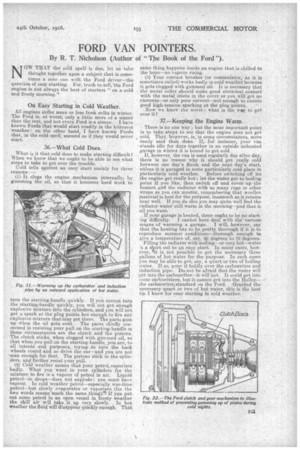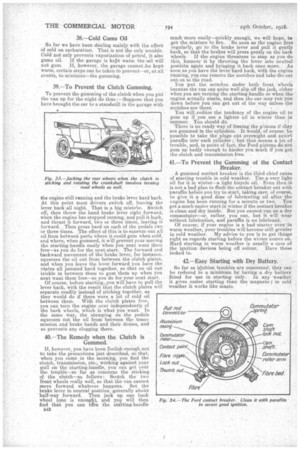FORD VAN POINTERS.
Page 17

Page 18

If you've noticed an error in this article please click here to report it so we can fix it.
By R. T. Nicholson (Author
NOW THAT the cold spell is due, let us take thought together upon a subject that is sometimes a sore one with the Ford driver—the question of easy starting. For, truth to tell,-the Ford engine is not always the best of starters "on a cold and frosty morning."
On Easy Starting in Cold Weather.
All engines suffer more or less from sulks in winter. The Ford is, at worst, only a little more of a sinner than the rest, and not every Ford is a sinner. I have known Fords that would start readily in the bitterest weather: on the other hand, I have known Fords that, in the cold spell, seemed as if they would never start.
36.—What Cold Does.
What is it that cold does to make starting difficult? When we know that we ought to be able to see what steps to take to get over the trouble. Cold tells against an easy start mainly for three reasons : — (1) It clogs the engine mechanism internally; by gumming the oil, so that it becomes hard work to turn the starting-handle quickly. If you cannot turn the starting-handle quickly, you will not get enough explosive mixture into the cylinders, and ou will not get a spark at the plug points hot enough to fire any explosive mixture that may get there. The parts gum up when the oil gets cold. The parts chiefly concerned in resisting your pun on the starting-handle in these circumstances are the clutch and the pistons. The clutch sticks, when clogged with gummed oil, so that when you pull on the starting-handle, you are, to all intents and purposes, trying to turn the back wheels round and so drive the car—and you are not • man enough for that. The pistons stick in the cylinders, and further resist your pull. (2) Cold weather means that your petrol vaporizes badly. What you want in your cylinders for the mixture to fire is a vapour of petrol in air. Liquid petrol—in drops—does not explode: you must have vapour. In cold weather petrol—especially war-time petrol—but slowly evaporates or vaporizes (for the two words means-much the same thing).nt If yea put out some petrol in an open vessel in frosty weather the chill air will take it up very slowly. In hot weather the fluid will disappear quickly enough. That of "-The Book of the Ford "). same thing happens inside an engine that is chilled to the bone—no vapour rising. (a) Your contact breaker (or commutator, as it is sometimes called) works badly in cold weather because it, gets clogged with gummed oil. It is necessary that the metal roller should make good electrical contact with the metal insets in the cover or you will get no currents—or only poor current—not enough to ensure good high-tension sparking at the plug points. Now we know the worst: what is the way to get over it ?
37.—Keeping -the Engine Warm. There is no one way; but the most important point is to fake steps to see that the engine does not get cold. That, loever, is, in some circumstances, more easily said than done. If, foi instance, your van -stands idle for days together in an outside unheated garage in winter it is bound to get cold. If, however, the van is used regularly day after day, there is no reason why it should get really cold between one day's finish and the next day's start, unless it is garaged in some particularly cold place in particularly cold weather. Before switching off let the engine get really hot; let the water get to boiling point if you like, then switch off and cover up the bonnet and' the radiator with as many rugs or other wraps as you can muster, remembering that woollen material is best for the purpose, inasmuch as it retains heat well. If you do this you may quite well find the radiator water still warm in the morning—rd that is all you want. If your garage is heated, there ought to be no starting difficulty. I cannot here deal with the' various means of warming a garage. I will, however, say that the heating has to be pretty thorough if it is to reproduce summer -conditions—thorough enough te give a temperature of, say, 60. degrees to 70 degrees. Filling the radiator with boiling—or very hot—water :s a sort cut to an easy start. In many cases, however, it is not possible to get the necessary three gallons of hot water for the purpose. In such cases you may be able to get, say, a quart or two of boiling water. If, so, pour it boldly over the carburetter and induction pipe. Do, not be afraid that the water will get into the carburetter—it will not. It could get into :some carburetters, but it cannot get into the Holley-the carburetter, standard on the Ford. Granted the necessary quart or two of hot water, this is the best tip I know for easy starting in cold weather.
38.—Cold Gums Oil
• So far we have been dealing mainly with the effect of cold on carburation. That is not the only trouble, Cold not only prevents vaporization of petrol, it also gums oil. If the garage is kerat warm the 'oil will not gum. If, however, the garage cannot be kept warm, certain steps can be taken to prevent—or, at all events, to mininaize—the gumming.
39.—To Prevent the Clutch Gumming.
To prevent the gumming of the clutch when you put the van up for the night do thus :—Suppose that you have brought the car to a standstill in the garage with • the engine still running and the brake lever hard back. At this point most drivers switch off, leaving the lever back all night. That is a big mistake. Switch off; then throw the hand brake lever right forward,• when the engine has stopped turning, and pull it back, and thrust it forward, two or three times, leaving it forward. Then press hard on each of the pedals two or three times. The effect of this is to squeeze out all oil from between parts where it could gum when cold, and where, when gummed, it will prevent your moving the starting-handle easily when you next want them free—as you do for the next start. The forward and backward movement of the brake lever, for instance, squeezes the oil out from between the clutch plates, and when you leave the lever forward you have the -elates all jammed hard together, so that no oil can trickle in between them to gum them up when you next want them free—as you do for your next start. • Of course, before starting, ,you will have to pull the lever back, with the result that the clutch plates will separate readily instead of sticking together, a..4
they would do if there were a lot of cold oil between them. With the clutch plates free, you can turn the engine over independently of the back wheels, which is what you want. In the same way, the stamping on the pedals squeezes out the oil from between the transmission and brake bands and their drums, and so prevents any clogging there.
40.—The Remedy when the Clutch is Gummed.
If, however, you have been foolish enough not to take the precautions just described, so that, when you come in the morning, you find the clutch, transmission, etc., working against your pull on the starting-handle, you can get over the trouble—so far as concerns the sticking of the clutch—as follows: Scotch the two front wheels really well, so that the van cannot move forward whatever happens. Set the brake lever in neutral position, generally about half-way forward. Then jack up one back wheel (one is enough), and you will then find that you can tarn the starting-handle n42
much more easily—quickly enough, we will hope, to get the mixture to fire. So soon as the engine fires regularly, go to the brake lever and pull it gently back, so that the brakes will press gently on the back wheels. If the engine threatens to stop as you do this, humour it by throwing the lever into neutral
i
position again and bringing t back once more. As soon as you have the lever-hard back, with the engine running, you can remove the scotches and take the car out on to the road.
You put the scotches under both front wheels because the van can quite well slip off the jack, either when you are turning the starting-handle or when the engine actually starts, and then the car may run you down before you can get out of the way unless the scotches -are there.
You will_rediice the tendency of the engine oil to gum up if you use a lighter oil in winter than in summer. Y4)11 should do. There is no ready way of freeing the p'stons if they are gummed in the cylinders. It would, of course, be possible to take the plugs out overnight and squirt paraffin into eaCh cylinder ; but that means a lot of trouble, and, in point of fact, the Ford pistons do not gum up badly enough to hinder you much if you get the clutch and transmission free.
4I.—To Prevent the Gumming of the Contact Breaker.
A gummed contact breaker is the third chief cause of starting trouble in cold weather. Use a very light oil for it in winter—a light bicycle oil. Even then it is not a bad plan to flush the edntaet breaker out with 'paraffin before you try to start, taking care, of course, to give it a good dose of lubricating oil after the engine has been running for a minute or two. You get a much easier start in winter if the contact breaker is clean and dry inside. But you cannot run on a dry commutator—or, rather, you can, but it will wear without lubrication, and paraffin is no lubricant.
Of course, if your engine is a bad' starter even in warm weather, your troubles will become still greater in cold weather. My advice to you is to get things right as regards starting before the winter comes en. Hard starting in warm weather is usually a ease of the ignition devices being off colour. Have these looked to.
42.—Easy Starting with Dry Battery.
So far as ignition troubles are concerned, they can be reduced to a minimum by having a, dry battery fitted for use in starting only. In any weather it gives eager starting than the magneto / in cold weather it works like magic. "






















